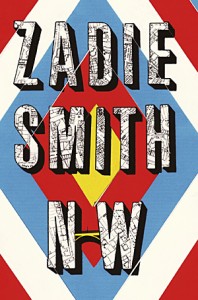 Zadie Smith’s latest novel NW, named for the postal code of the northwest London neighborhood in which it is set, follows the lives of four children of the fictional Garvey project buildings: Leah Hanwell, Felix Cooper, Keisha (renamed Natalie) Blake and Nathan Bogle, picking up when they are each in their early 30s. The novel’s narrative is organized around these four people, beginning with Leah and ending with Nathan, and plays with the chronology to present portraits of their lives and how they have been shaped by the neighborhood in which they grew up. In a novel about race and class and gender (I roll my eyes as much as anyone at those terms, so constantly trotted out in defense of pablum, but Smith deserves your attention) and language, one concern, in particular, dominates this project: why is it that, given the same background, some people go on to success and others squalor?
Zadie Smith’s latest novel NW, named for the postal code of the northwest London neighborhood in which it is set, follows the lives of four children of the fictional Garvey project buildings: Leah Hanwell, Felix Cooper, Keisha (renamed Natalie) Blake and Nathan Bogle, picking up when they are each in their early 30s. The novel’s narrative is organized around these four people, beginning with Leah and ending with Nathan, and plays with the chronology to present portraits of their lives and how they have been shaped by the neighborhood in which they grew up. In a novel about race and class and gender (I roll my eyes as much as anyone at those terms, so constantly trotted out in defense of pablum, but Smith deserves your attention) and language, one concern, in particular, dominates this project: why is it that, given the same background, some people go on to success and others squalor?
Smith’s characters become case studies in search of her answer. Leah and Keisha are best friends, of similar intelligence and sensibility, but Leah flounders in university and ends up working in a charity for little money. Keisha becomes a successful barrister (not lawyer!), renames herself Natalie and marries a wealthy man. The men, on the other hand, fail spectacularly. Nathan ends up homeless and Felix, at our first encounter with him, is recovering from a drug addiction. It is here that a digression becomes necessary. Shortly before beginning the book, I watched a YouTube interview with Smith entitled “On bad girls and the complicated midlife,” and my initial reaction to the title was dismissive – it seemed like the kind of faux-controversial headline editors use to provoke attention. But NW really is about “bad girls,” and I’d like to make the counterintuitive point that such a project is wonderful for women. The men in this book, while far from saints, are good husbands and fathers, noble, self-sacrificing, high-minded. The women, though far from devils, are self-interested, labile, adulterous and disinterested in children or the prospect of children (“I don’t want to push something the size of a watermelon out of something the size of a lemon”). One deceives her partner into believing they are trying to have a baby when, all along, she is surreptitiously popping stolen contraceptives. Another arranges clandestine threesomes and casual sexual encounters over the Internet, unbeknownst to her husband and infant children. The simple truth is that too often portraits of women in contemporary fiction are drawn with the best of intentions and the worst of scope; men are free to be villains but women must be noble, self-effacing and -sacrificing. Smith will have none of this, and her work is the stronger for it.
As always, Smith’s prose delights. Whether in the staccato outbursts of emails and text messages, the truncated passages meant to evoke emails and text messages, or the marvelous snippets of dialogue, so faithful to London’s many accents and idioms, melody, humor and thought abound. The novel’s difficulties are at the level of characterization. Natalie and Leah are fully drawn, and Felix, though he appears only briefly, is magnificently portrayed. Nathan, on the other hand, is given short shrift, his section feeling less like a developed narrative than an afterthought. And while Natalie is given the most time and attention, I fear many of her midlife misadventures take the reader by surprise, ultimately seeming untrue to her character. We are told that, sometime in her early twenties, she became “crazy busy with self-invention. She lost God so smoothly and painlessly that she had to wonder what she’d ever meant by the word.” Some time later, when she has successfully metamorphosed from a child of the projects into a wealthy lawyer and mother, she forgets something altogether more vital to her early character – poverty. “Natalie Blake had completely forgotten what it was like to be poor. It was a language she’d stopped being able to speak, or even to understand.” Earlier in the novel, she bemoans the popular conception of poverty as being “a personality trait,” something generated by laziness or stupidity, but when, in the closing pages, she is asked by her best friend why they have gone on to success while others just like them have not, Natalie’s answer is an echo of the claim she once repudiated: “We were smarter and we knew we didn’t want to end up begging on other people’s doorsteps. We wanted to get out. People like [x] – they didn’t want it enough. I’m sorry if you find that answer ugly, […] but it’s the truth.”
The reader, no doubt, is meant to be dubious of Natalie’s wisdom, but she is the novel’s central character and, unless the answer is dumb luck, little is offered in the way of rebuttal. Ultimately, these flaws rob NW of much of its dramatic potential, but what is left, however flawed, is a lyrically exuberant, stylistic and insightful portrait of utterly human characters who, like the novel that gives birth to them, are beautiful in spite of their imperfections.